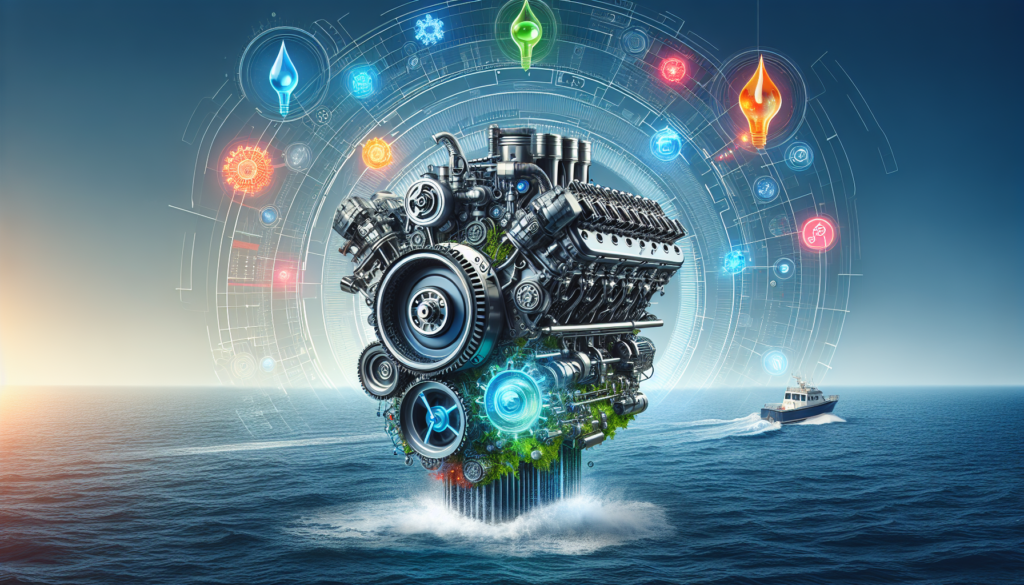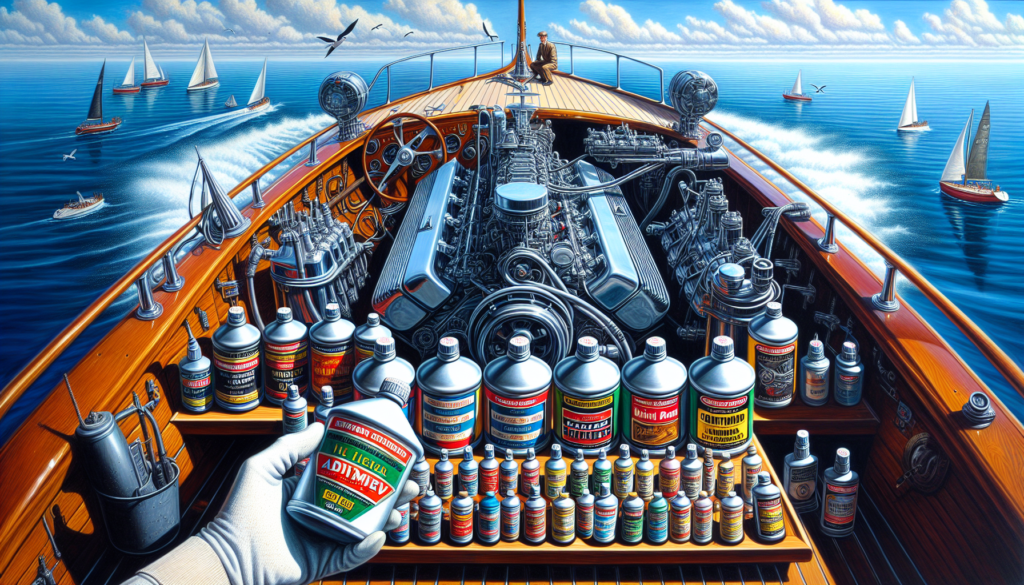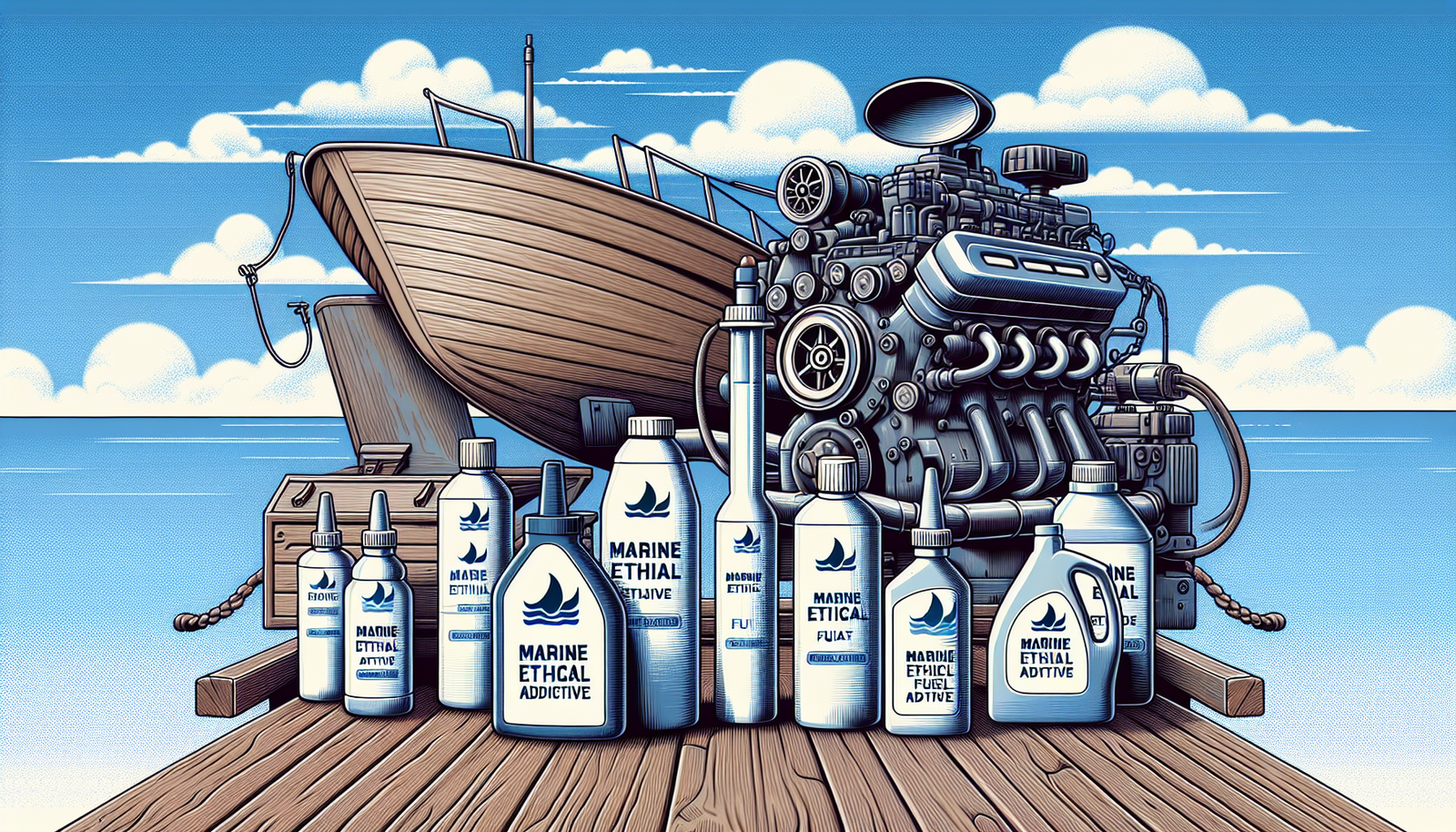Imagine sailing on serene waters, your boat engine humming smoothly, free from irritating sputters or power loss. That’s what the right fuel additives can do for you. In the article, “The Best Fuel Additives For Improving Boat Engine Performance”, you discover products capable of taking your boat engine’s performance to the next level. You’ll understand how they work, what exactly they do to your boat’s fuel system, and most importantly, you get to see the top options available right now. Prepare for an insightful journey into the world of fuel additives, as they tilt the odds in favor of optimal boat engine performance.

Understanding Fuel Additives
What are fuel additives?
Fuel additives are compounds formulated to enhance the quality and efficiency of fuels used in motor vehicles, including boats. They are often used to improve fuel’s environmental performance, increase its octane rating, or improve the vehicle’s performance.
How do fuel additives work?
Fuel additives work by improving the chemical composition of the fuel. When added to the fuel, these additives can perform a wide variety of functions that enhance fuel properties and performance. For example, they may help to clean and protect the engine, reduce emissions, enhance the fuel’s octane rating, or stabilize the fuel.
Benefits of using fuel additives in boat engines
Using fuel additives in boat engines can bring multiple benefits. First and foremost, they can help to improve fuel economy and engine performance. They can also lead to reduced emissions and could extend the lifespan of your boat engine. Furthermore, fuel additives can provide better protection against fuel degradation and gelling, especially under cold weather conditions.
Potential drawbacks of fuel additives
While fuel additives come with many benefits, they also have potential drawbacks. For example, not all fuel additives are compatible with every engine type and misuse can lead to engine damage. Some additives can also be harmful to the environment if not properly handled. Therefore, you should always use fuel additives carefully and according to the manufacturers’ instructions.
Common Types of Fuel Additives
Octane boosters
Octane boosters are designed to increase a fuel’s octane rating, consequently reducing knocking or pinging in the engine, which can lead to engine damage. They help improve the fuel’s combustion process, resulting in better engine performance and efficiency.
Fuel stabilizers
Fuel stabilizers are essential for boats that aren’t used daily. They help protect the fuel against degradation and oxidation, prolong the fuel’s lifespan, and prevent it from forming gum and varnish that can clog the engine.
Cetane boosters
Just like octane boosters, cetane boosters aim to increase the cetane number of diesel fuel, resulting in improved ignition, better fuel combustion, and reduced engine noise.
Cleaning agents
Fuel additives with cleaning agents can effectively clean the fuel system by removing deposits and gunk build-up from the fuel injectors, carburetor, and other engine components. They can help maintain peak engine performance and fuel efficiency.
Anti-gelling agents
These are particularly useful for boat engines that use diesel fuel and are operated in cold environments. Anti-gelling agents prevent the fuel from gelling or waxing, which could clog the fuel filter and injectors.
Emission reducers
Emission reducers are fuel additives designed to reduce the volume of harmful emissions produced by the engine combustion process. They are commonly used to comply with emissions control regulations.
The Role of Additives in Boat Engine Performance
Improving fuel efficiency
Fuel additives can improve the combustion process in your boat’s engine, leading to better fuel efficiency. This means you can go farther on the same amount of fuel, which will save you money in the long run.
Reducing emissions
As mentioned earlier, some fuel additives are designed to reduce harmful emissions caused by engine combustion, contributing to a cleaner and greener environment.
Extending engine lifespan
Fuel additives can help to protect your engine by reducing harmful deposits, protection against oxidation and cold temperatures, which may lead to a longer engine life.
Improving ignition and power
Certain fuel additives can enhance the ignition process and boost your engine’s power output, leading to improved performance.
The Impact of Fuel Quality on Additive Efficiency
Dealing with low quality fuel
Low-quality fuel can result in poor engine performance, increased emissions, and quicker engine wear. Fuel additives can help in alleviating these issues by improving the fuel’s combustion properties and cleaning the engine parts from deposits left by low-quality fuel.
How additives can help compensate for fuel quality
Fuel additives can enhance the properties of low-quality fuel by increasing its octane or cetane numbers, improving its stability, and removing harmful deposits. By doing so, they can mitigate the negative effects of low-quality fuel on engine performance and longevity.
Limitations of additives in poor fuel
While fuel additives can counteract some of the poor attributes of low-quality fuel, they are not a magic cure-all. They can’t completely fix overly contaminated fuel or compensate for fuel that is far below the necessary standard for your specific engine.

Best Fuel Additives for Outboard Engines
Recommended additives for outboard engines
Fuel stabilizers and cleaning agent additives are highly recommended for outboard engines. They work brilliantly by preventing fuel degradation and removing deposits, leading to smooth engine operation.
Reviewing top selling additives
There are numerous fuel additives available on the market. Some of the top-selling additives for outboard engines include Star Tron Enzyme Fuel Treatment, Yamaha Fuel Stabilizer & Conditioner, and Quickleen Engine & Fuel System Cleaner.
Why are these additives ideal for outboard engines
These additives are ideal for outboard engines because they deliver all the necessary benefits: they enhance performance, extend engine life, improve fuel stability, and reduce harmful emissions. Additionally, users praise their effective cleaning abilities and easy application.
Best Fuel Additives for Inboard Engines
Recommended additives for inboard engines
For inboard engines, cetane boosters and anti-gelling agents are often recommended, especially for engines operating in cold environments. Cleaning agents and fuel stabilizers work well too for inboard engine maintenance.
Reviewing top-selling additives
When it comes to inboard engines, additives like Lucas Oil Fuel Treatment, STA-BIL Diesel Fuel Stabilizer, and Opti-Lube XPD Diesel Fuel Improver often come on top for their outstanding performance.
Why are these additives ideal for inboard engines
The mentioned additives work extraordinarily well with inboard engines by enhancing fuel combustion, protecting against gelling, and keeping the fuel stable, leading to superior engine performance and longevity.

Understanding Compatibility and Suitability
How to choose the right additive for your engine
Choosing the right additive involves understanding your engine’s type (inboard or outboard), fuel used (gasoline or diesel), and the conditions under which it is operated. Consult the boat manufacturer’s guidelines and consider consulting with a marine engine technician to help you choose the suitable additive.
Understanding differences in fuel types and corresponding additives
Different fuel types – gasoline, diesel, and ethanol – have different needs, and thus require different additives. For example, diesel engines might require cetane boosters and anti-gelling agents, while gasoline engines might need octane boosters.
Specific considerations for marine engines
When it comes to marine engines, considerations include the duration and frequency of use (which would determine if a fuel stabilizer might be necessary), and prevalent weather conditions (which may require anti-gelling agents for cold climates), etc.
How to Use Fuel Additives Effectively
Correct dosage and application
Always read and follow the manufacturers’ instructions to ensure an effective application. The correct dosage of fuel additive often depends on the fuel’s quantity, so measurements should be precise.
Best practices for storage and handling
Fuel additives should be stored in a cool, dry place away from direct sunlight. They should always be tightly sealed when not in use, and precautions should be taken to avoid skin or eye contact.
How often to use fuel additives
How often you should use a fuel additive depends on several factors like the type of additive, engine’s condition, and usage of the boat. While some additives need to be added with each fill-up, others might only be needed with seasonal changes or after a certain mileage.

Case Studies of Fuel Additive Use in Boat Engines
Real-world success stories
There are countless success stories where the right use of fuel additives has led to improved engine performance, reduced maintenance costs, and even boosted boat resale value, speaking volumes about their effectiveness.
Comparing performance with and without additives
In comparison studies, engines using fuel additives tend to perform better in terms of power, efficiency, and lesser emission, compared to those running without additives. However, results may vary based on factors like engine type, fuel quality, and additive type.
Challenges in applying and observing results
Some of the challenges in using fuel additives include identifying the right type and dose for specific engine needs, and discerning their impact on engine performance, which may not be immediately noticeable. Also, without proper documentation, it can be hard to track improvements over time.
Improvements over time
With continued use, you’ll likely notice gradual improvements in your boat’s engine performance. Problems such as rough idling, hard starts, and knocking may reduce, while overall engine operation will become smoother and more reliable.
Future Trends in Fuel Additives and Boat Engine Performance
Emerging additive technologies
As the fuel technology advances, so do the additives. Emerging additive technologies focus on enhancing performance while maintaining an eco-friendly approach by further reducing emissions and maintaining fuel efficiency.
Sustainability and emissions
The increased focus on sustainability is driving the development of fuel additives that not only enhance engine performance but also reduce harmful emissions significantly, contributing to the global effort towards a cleaner environment.
How engine design might impact additive use
As engine designs evolve to become more efficient and environment-friendly, the role of fuel additives will continue to be pivotal. Advanced engines would require advanced fuel additives that can address the unique demands these engines present.


[…] the realm of boat engine fuel additives might seem like a daunting endeavor. The success of your boat’s engine performance lies […]